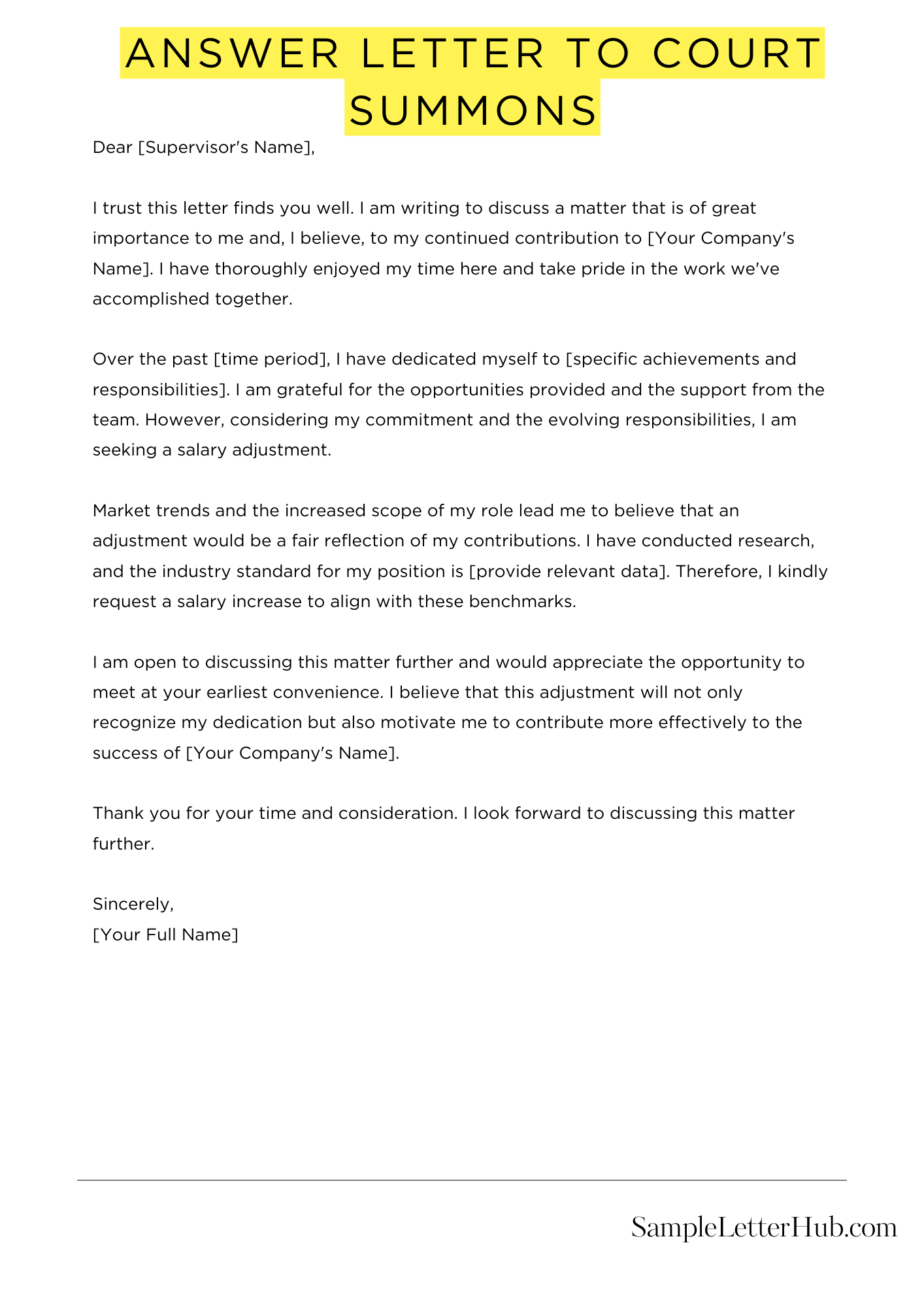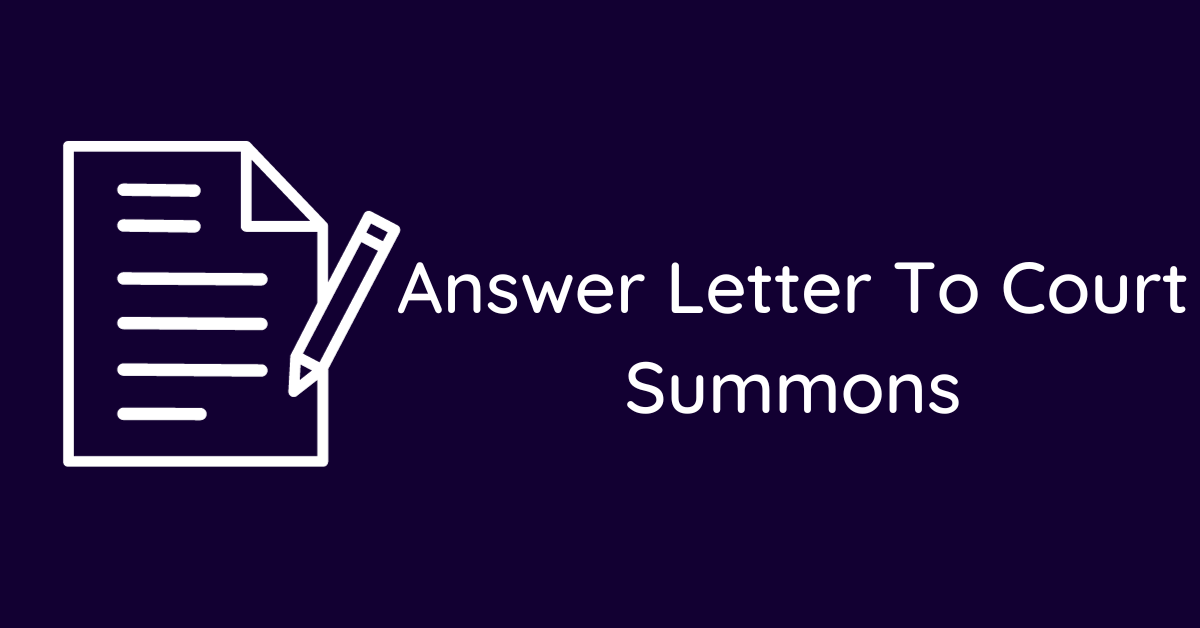Are you facing a court summons and don’t know how to respond? Don’t worry, we’ve got you covered. In this article, we will explain what an answer letter to court summons is and its purpose.
An answer letter is a formal response to a court summons that outlines your defense or explanation for the alleged offense. Its purpose is to provide the court with your side of the story and to avoid default judgment.
To make it easier for you, we will provide templates, examples, and samples of answer letters to court summons. These samples will help you understand the format and language used in such letters.
You can use these samples as a guide to write your own letter, tailored to your specific situation. We understand that legal matters can be overwhelming, and we want to make the process as simple as possible for you.
So, whether you’re facing a traffic violation, a civil lawsuit, or any other legal matter, our samples will help you draft a professional and effective answer letter to court summons. Let’s get started!
Answer Letter To Court Summons
Dear [Judge’s Last Name or Honorable [Judge’s Full Name]],
I hope this letter finds you well. I am writing in response to the court summons I received regarding the case mentioned above. I acknowledge the receipt of the summons and appreciate the opportunity to address the matter.
After careful consideration, I would like to request additional time to gather the necessary information and seek legal advice before providing a detailed response. I assure you of my full cooperation throughout this process and am committed to fulfilling any requirements set forth by the court.
I kindly request an extension until [Proposed Extended Date] to submit my response and any required documentation. I believe this extension will allow me to present a more comprehensive and accurate account of the situation.
Thank you for your understanding, and I am prepared to comply with any conditions you deem necessary during this period. If there are specific guidelines or procedures I should follow in requesting an extension, please provide guidance, and I will promptly adhere to them.
Thank you for your time and consideration. I look forward to your response and appreciate your assistance in resolving this matter judiciously.
Sincerely,
[Your Full Name]
Letter Of Summon
Dear [Defendant’s Name],
I hope this letter finds you well. You are hereby summoned to appear in [Court’s Name] on [Date] at [Time] to respond to the allegations made against you in Case No. [Case Number]. Failure to appear may result in legal consequences, including a default judgment being entered against you.
Please bring any relevant documents, evidence, or witnesses that support your case. It is crucial to adhere to the court’s schedule and procedures to ensure a fair and timely resolution of this matter.
If you have any questions or concerns, you may contact the court clerk at [Court Clerk’s Contact Information]. Failure to comply with this summons may lead to further legal actions, so it is in your best interest to attend the scheduled hearing.
Thank you for your cooperation in this matter.
Sincerely,
[Your Full Name]
Defendant Answer To Complaint Template
Dear [Plaintiff’s Full Name],
I am writing in response to the complaint filed against me in Case No. [Case Number]. I have received the complaint, and after careful consideration, I am submitting my answer as follows:
1. I deny the allegations made in the complaint as [state your reasons for denial].
2. [Additional responses to specific allegations in the complaint].
3. [Include any affirmative defenses or counterclaims, if applicable].
I request that the court dismiss the claims against me and grant any further relief it deems just and proper. I am prepared to participate in mediation or other alternative dispute resolution methods to resolve this matter amicably.
Thank you for your attention to this matter. I look forward to a fair and just resolution.
Sincerely,
[Your Full Name]
Letter Of Respond To A Summons And Complaint
Dear [Court Clerk or Plaintiff’s Attorney’s Name],
I am writing to acknowledge the receipt of the summons and complaint served upon me in the matter of Case No. [Case Number]. I understand the gravity of the situation, and I am committed to addressing the legal proceedings promptly and responsibly.
After careful review of the complaint, I hereby provide the following responses:
1. I admit [admit specific facts, if any].
2. I deny [deny specific allegations, if any].
3. I am [state any affirmative defenses or counterclaims, if applicable].
I am in the process of consulting with legal counsel to ensure that my rights are protected and to prepare a formal response in accordance with the court’s procedures. I request additional time, if possible, to submit a comprehensive response to the court.
Thank you for your attention to this matter, and I appreciate your understanding as I navigate through the legal process.
Sincerely,
[Your Full Name]
Legal Response Letter To Court Summons
Dear [Court Clerk or Plaintiff’s Attorney’s Name],
I am writing in response to the summons received regarding Case No. [Case Number]. I acknowledge the legal proceedings and appreciate the opportunity to provide my response.
After careful consideration, I wish to inform the court of the following:
1. I am in the process of obtaining legal counsel to ensure proper representation in this matter.
2. I request additional time to prepare a comprehensive response as I navigate through the legal procedures.
I understand the seriousness of the allegations and assure the court of my commitment to addressing this matter diligently and responsibly.
Thank you for your attention to this response. I look forward to complying with all necessary legal requirements and appreciate your understanding during this process.
Sincerely,
[Your Full Name]

How to Write an Effective Answer Letter to Court Summons
If you have received a court summons, it is important to respond promptly and appropriately. One of the most common ways to respond is by writing an answer letter. In this article, we will guide you through the process of writing an effective answer letter to court summons.
1. Understand the Purpose of the Answer Letter
The first step in writing an answer letter is to understand its purpose. The answer letter is your opportunity to respond to the allegations made against you in the court summons. It is your chance to present your side of the story and defend yourself against the claims made by the plaintiff.
2. Read the Court Summons Carefully
Before you start writing your answer letter, it is important to read the court summons carefully. Make sure you understand the allegations made against you and the deadline for responding. Take note of any specific instructions or requirements for the answer letter.
3. Gather Evidence and Information
Once you have read the court summons, gather any evidence or information that supports your defense. This may include documents, witness statements, or other relevant information. Make sure you have all the necessary information before you start writing your answer letter.
4. Follow the Proper Format
When writing your answer letter, it is important to follow the proper format. This includes addressing the court, identifying the case, and clearly stating your response to each allegation. Use clear and concise language, and avoid using technical jargon or legal terms that may be confusing.
5. Be Honest and Accurate
When writing your answer letter, it is important to be honest and accurate. Do not make false statements or misrepresent the facts. Stick to the truth and present your defense in a clear and convincing manner.
6. Seek Legal Advice if Necessary
If you are unsure about how to respond to the court summons, or if you need legal advice, it is important to seek help from a qualified attorney. They can guide you through the process and help you prepare an effective answer letter.
7. Submit Your Answer Letter on Time
Finally, make sure you submit your answer letter on time. Failure to respond to a court summons can result in a default judgment against you. Make sure you meet the deadline and submit your answer letter in a timely manner.
FAQs About Answer Letter to Court Summons
1. What is a court summons?
A court summons is a legal document that requires an individual to appear in court at a specific date and time to respond to a legal complaint or charge.
2. What is an answer letter to a court summons?
An answer letter to a court summons is a written response to the legal complaint or charge that has been filed against an individual. It is a formal document that outlines the individual’s defense or explanation of the situation.
3. What should be included in an answer letter to a court summons?
An answer letter to a court summons should include the individual’s name, address, and contact information, as well as a clear and concise response to the legal complaint or charge. It should also include any relevant evidence or documentation to support the individual’s defense.
4. What is the deadline for submitting an answer letter to a court summons?
The deadline for submitting an answer letter to a court summons varies depending on the jurisdiction and type of legal case. It is important to check the court summons for the specific deadline and to submit the answer letter before the deadline to avoid any legal consequences.
5. What happens if an individual does not submit an answer letter to a court summons?
If an individual does not submit an answer letter to a court summons, the court may issue a default judgment against them, which means that the court will automatically rule in favor of the plaintiff or prosecutor.
6. Can an individual change their answer after submitting an answer letter to a court summons?
In some cases, an individual may be able to amend their answer after submitting an answer letter to a court summons. However, it is important to consult with a legal professional to determine the specific rules and procedures for amending an answer.
7. Do I need a lawyer to submit an answer letter to a court summons?
While it is not required to have a lawyer to submit an answer letter to a court summons, it is recommended to consult with a legal professional to ensure that the individual’s rights and interests are protected. A lawyer can also provide guidance on the legal process and help the individual prepare a strong defense.
Related:

